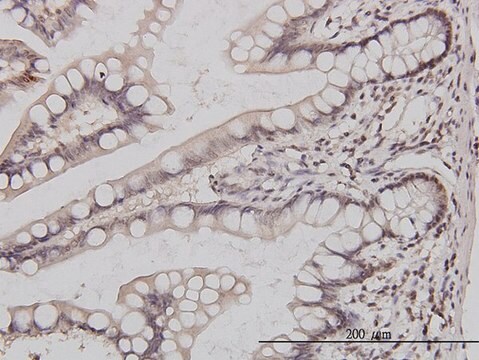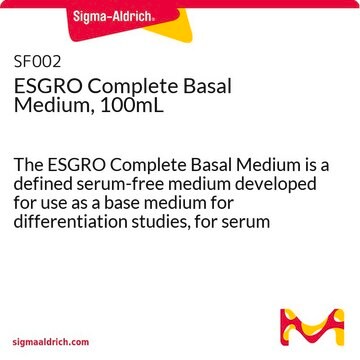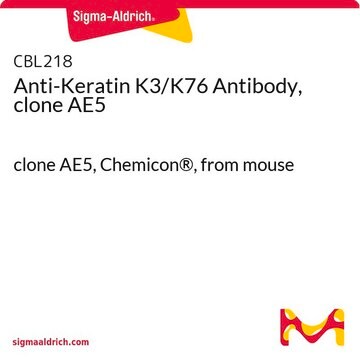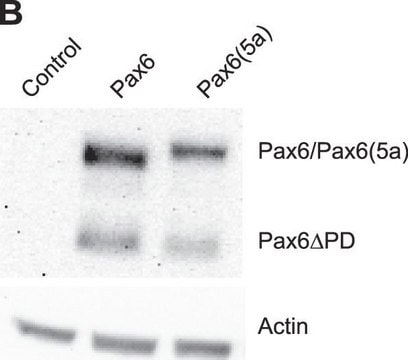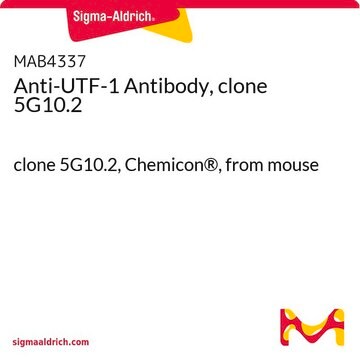MAB339
Anti-GABA A Receptor α1 chain Antibody, NT, clone BD24
clone BD24, Chemicon®, from mouse
Synonym(s):
Anti-DEE19, Anti-ECA4, Anti-EIEE19, Anti-EJM, Anti-EJM5
About This Item
Recommended Products
biological source
mouse
Quality Level
antibody form
purified immunoglobulin
antibody product type
primary antibodies
clone
BD24, monoclonal
species reactivity
human, pig, avian, bovine
should not react with
feline, rat
manufacturer/tradename
Chemicon®
technique(s)
immunohistochemistry: suitable
immunoprecipitation (IP): suitable
western blot: suitable
isotype
IgG1
NCBI accession no.
UniProt accession no.
shipped in
wet ice
target post-translational modification
unmodified
Gene Information
human ... GABRA1(2554)
Specificity
Immunogen
Application
Western blot: 20 μg/mL
Immunoprecipitation
Optimal working dilutions must be determined by end user.
APPLICATION NOTES FOR MAB339
IMMUNOHISTOCHEMISTRY
1) Fresh tissue (human) should be used (3-6 hours postmortem). The tissue should be immersion fixed in 2% paraformaldehyde/0.1% glutaraldehyde. Prepare 50 mm sections and store in cryoprotective solution at -15°C.
2) Sections should be incubated floating in suitable small vials.
3) Block endogenous peroxidase with 100 mmol/L Tris-HCl, 150 mmol/L NaCl, pH 7.4 (Buffer A) containing 3% H2O2 (v/v) and 10% methanol for 20 min at room temperature.
4) Wash sections in Buffer A. Incubate sections in Buffer A containing 5% fetal bovine serum (v/v) and 0.1-0.5% Triton X-100 (v/v).
5) Wash sections in Buffer A. Incubate sections with MAB339 (diluted 10-20 mg/mL in Buffer A containing 5% fetal bovine serum (v/v) and 0.1-0.5% Triton X-100 (v/v) for 12-36 hours at +4°C
6) Wash sections in Buffer A.
7) Detect with standard secondary antibody detection system (PAP, ABC, etc.).
8) Wash sections in Buffer A.
9) Mount sections on chrome alum-coated slides, dry, dehydrate, and apply coverslips.
Neuroscience
Neurotransmitters & Receptors
Physical form
Storage and Stability
Other Notes
Legal Information
Disclaimer
Not finding the right product?
Try our Product Selector Tool.
recommended
Storage Class Code
10 - Combustible liquids
WGK
WGK 2
Flash Point(F)
Not applicable
Flash Point(C)
Not applicable
Certificates of Analysis (COA)
Search for Certificates of Analysis (COA) by entering the products Lot/Batch Number. Lot and Batch Numbers can be found on a product’s label following the words ‘Lot’ or ‘Batch’.
Already Own This Product?
Find documentation for the products that you have recently purchased in the Document Library.
Our team of scientists has experience in all areas of research including Life Science, Material Science, Chemical Synthesis, Chromatography, Analytical and many others.
Contact Technical Service